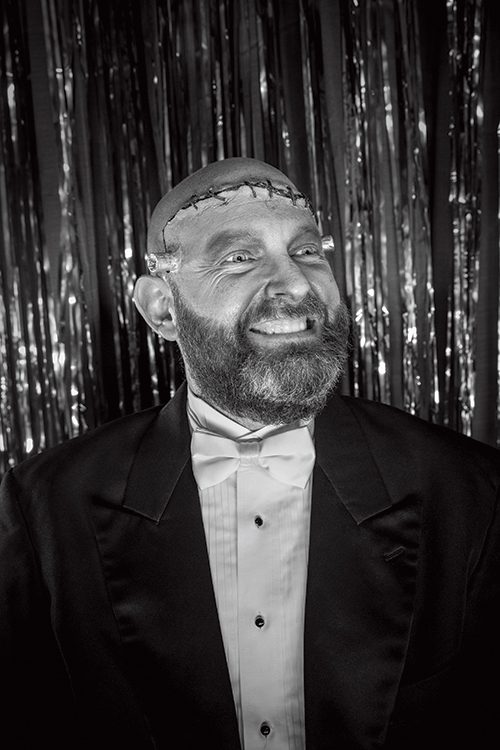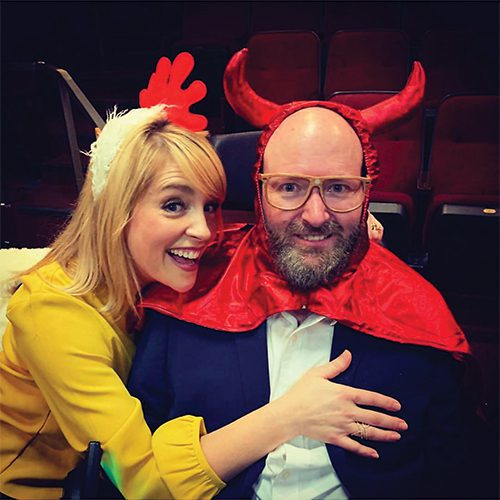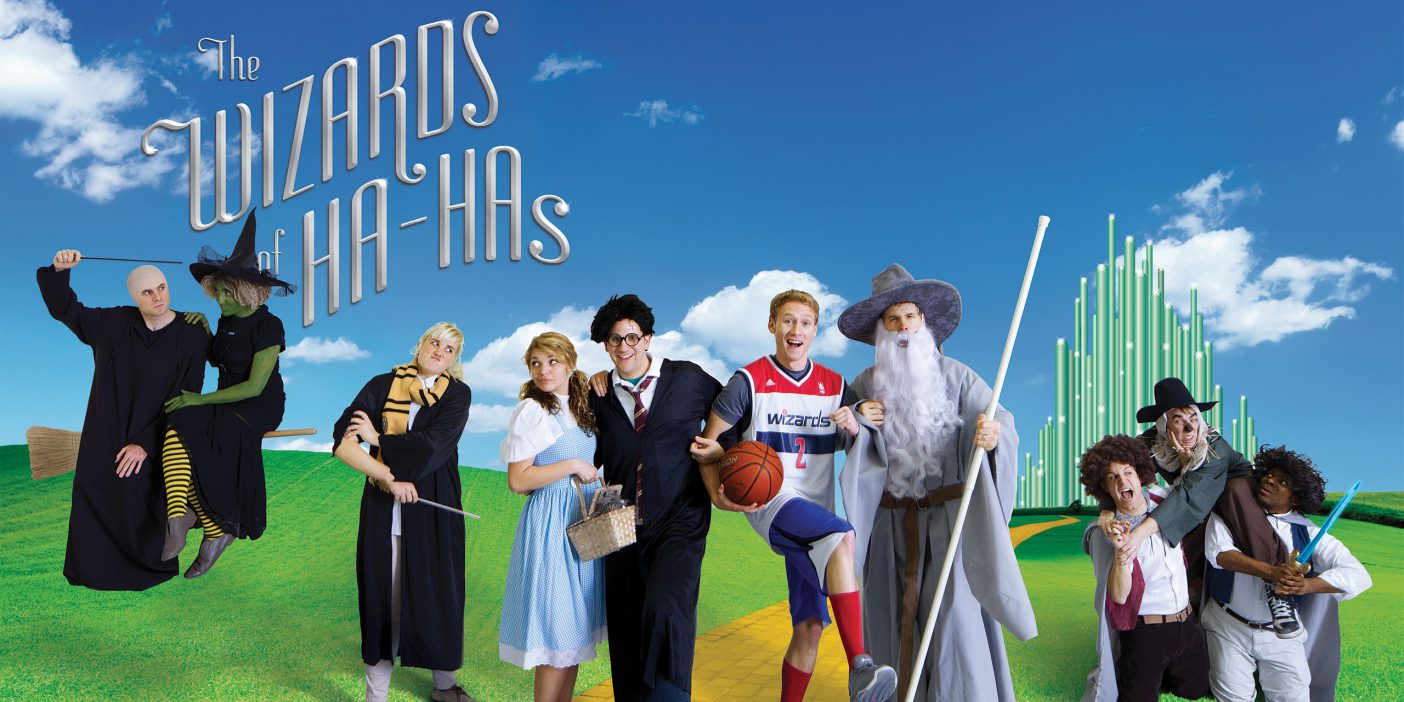Permission to Laugh

Their life together might feel tragic if it weren’t also so . . . funny. How Chris and Lisa Clark continued laughing through their tears.
By Melody McGrath Warnick (BA ’99) in the Summer 2020 Issue
Note: After a long battle with ALS, Christopher Clark passed away on June 5, 2020, just as this article was being prepared to go to press.
Lisa Valentine Clark (BA ’97) would like alligators. A lot of alligators, please. Let’s clarify. Not Lisa herself, but the fluttery Edwardian lady-of-the-manor she’s playing on Show Offs, BYUtv’s half-hour improv comedy show, in an episode aptly named “Pride and Reptiles.” Her castmate Jake Van Wagoner suggests that to be truly fashionable, the lady must stock her estate with alligators. “What a jolly good time!” Lisa explains in a plummy British accent. “I accept.”

Things get weird fast on Show Offs. What makes it work is that Lisa and the rest of the cast adhere religiously to the first rule of improv: whatever comes, they say, “Yes, and . . .” No one questions. No one goes, “Wait a minute, alligators? That’s crazy talk!” Whatever happens, they roll with it and make it hilarious. “Alligators? Naturally.”
The “yes, and” skills she picked up performing with the Garrens Comedy Troupe as a BYU student have become a lifelong guiding philosophy. “Your whole life is going to be doing improv and saying, ‘Yes, and . . . ,’ then freaking out later in the privacy of your own home,” Lisa says. Life hands you a mess—sometimes alligators—and you go with it and turn it into something better.
In March 2016 life dropped a massive metaphorical gator on the Provo doorstep of Lisa and her husband, Christopher L. Clark (BA ’00, PhD ’12), when Chris, then 43, was diagnosed with amyotrophic lateral sclerosis, better known as ALS or Lou Gehrig’s disease. The progressive motor-neuron disease slowly kills off the cells that control voluntary muscle movement, robbing sufferers like Chris of the ability to drive a car or eat their favorite dinner or crack a joke or hug their kids.
For years Chris had been a fixture in the Utah theater scene, a beloved actor, director, and professor of theater at Utah Valley University. His drama game is strong. He’s also, as Lisa puts it, “the funniest person I know, for sure. And I’m okay with that. I wanted to marry up.”
In other words, he’s also mastered “yes, and.” So in the four-plus years since Chris’s diagnosis, that’s been the Clarks’ approach. Take the alligator you didn’t ask for and make it funny.
In late 2018, for instance, ALS was starting to destroy Chris’s ability to speak. He’d already been in a wheelchair for two years; his hands could no longer play the piano or hold a pencil. But now, as the muscles in his mouth and jaw began to fail, Chris’s words emerged garbled and slurred. It was horrible and awful and terrifying. But at the moment, his voice was also kind of . . . well, funny.

“ALS has taken many things away from me but one thing it’s given me is the ability to play an incredibly convincing Frankenstein.” —Chris Clark
How do you say “yes, and” to that? Naturally you film a black-and-white homage to the famous scene from Mel Brooks’s comedy classic Young Frankenstein. In the video on Chris’s Instagram (@topher_clark), his cousin Ryan Simmons, as the dapper doctor, sings, “If you’re blue and you don’t know where to go to why don’t you go where fashion sits?”
Ryan pauses, and Chris, made up like Frankenstein with scars and bolts, finishes the line: “Puttin’ on the Ritz.” It leaves his throat in a half-growl, half-moan. Chris goes on to tap dance (Ryan moving his feet) and recoils at a flame (from a lighter), just as the movie monster did.
Watching the video, you’re simultaneously laughing and wondering if you should. Can an illness that strips a person of his physical abilities, locking him in his own body, possibly be funny?
Chris thinks so—by the last chorus it takes him a full eight seconds to get out the final “Puttin’ on the Ritz” through his laughter. In the caption for the video (titled “Putting on the Chris”) on Instagram, he writes, “ALS has taken many things away from me but one thing it’s given me is the ability to play an incredibly convincing Frankenstein.”
That awkwardness you feel—am I allowed to laugh at this?—is exactly where the comedy lies, Lisa explains. “The video is Chris’s way of giving us permission to laugh. He’s saying, ‘I sound like this. I can’t talk anymore. And guess what it sounds like? It sounds like Frankenstein’s monster. Let’s lean into that.’”
The more his body shuts down, the more Chris has let himself become a comedic prop. Always a fan of Halloween, he’s continued his tradition of next-level costumes by capitalizing on his wheelchair, one year dressing as the Lincoln Memorial while Lisa was the Statue of Liberty. He makes funny videos of friends racing his wheelchair down the sidewalk or of his brother pelting him with a snowball.
“I’m sure it’s a coping mechanism, but we laugh at ALS a lot,” says Chris. “It makes zero sense. Yesterday [during the COVID-19 outbreak] we saw a news report about the health dangers of touching your face. Lisa and I laughed because, honestly, I haven’t touched my face since 2017.”
To be clear, he didn’t so much say this as write it using high-tech assistive-technology eyeglasses that pinpoint letters on a specialized computer. (His email sign-off is “I typed this email with my eyes!”) Because Chris’s ability to speak is now gone altogether, he must go through the laborious process of spelling out his thoughts, then waiting for them to be expressed in the Stephen Hawking–like monotone of the computer attached to his wheelchair. “It’s just a ridiculous disease,” Chris adds.
Clearly the Clarks’ life is not 24/7 laughter. But in 25 years of marriage, they’ve gotten very good at saying, “Yes, and . . . ,” to whatever craziness is thrown at them. Is it possible that, despite their challenges, they’re still having more fun than the rest of us?

When the Devil Met the Chicken
Chris and Lisa met in 1993 as BYU undergrads performing in a biblical-themed English Society play called Mysteries: The Creation. Fresh off his mission to Finland, Chris was cast as Satan. Lisa was a chicken on Noah’s ark. (Eventually she was promoted to Noah’s dove. “I don’t want to brag,” she says, “but you know, whatever, it was my time to shine.”)
Each thought the other was hilarious. Their dates left Lisa in pain from laughing so hard. After they married, their combined forces only made them more interesting. In 1995 the Clarks threw an epic Halloween costume party at Chris’s family cabin in Wallsburg, Utah. At one point during the evening, BYU theater professor David E. Morgan (BA ’85) performed a dramatic reading of Edgar Allen Poe’s “The Tell-Tale Heart.” Just as the story of a murderer who’s haunted by the sound of his victim’s heartbeat reached its climax, a BUMP-BUMP echoed from beneath the floors of the cabin. Everyone screamed. “Chris went in the crawl space beneath the cabin and thumped on the floor underneath at just the right time,” remembers Gina Valentine James (BS ’97), Lisa’s sister. “We all about had heart attacks.”
At BYU Chris had switched his major from theater to English because he thought it might be more practical, perhaps the precursor to a law degree one day. But in 2001 he decided to go full throttle with drama by enrolling in an MFA program in directing Shakespeare at the University of Exeter in England. Lisa’s reaction was classic “yes, and.” She told Chris to do it. “It was one of the few times where I was like, ‘Oh that’s exactly what we’re going to do,’” she says.
Off they went to England right after 9/11, into what turned out to be the coldest, loneliest winter of Lisa’s life, home alone with two boys 3 and under. “We had four channels on the TV, and every day I had to watch Matlock at 1,” she remembers. “If you know me and TV, that’s a dark time, because Matlock? What?”
Hard as it was, the degree changed the trajectory of their lives. Back home in Provo, Chris directed plays for community theaters, taught drama at Utah Valley University, and acted as Paul in the Church’s Bible videos. Lisa cofounded an improv troupe called the Thrillionaires, wrote a book about parenting, starred in the movie Once I Was a Beehive, and went viral in commercials for Chatbooks. (Best line: “Motherhood goes by too fast. I haven’t slept more than four hours in 12 years.”) Today, along with her role on Show Offs, she has her own BYUradio morning talk program, called The Lisa Show.
Some of these gigs paid well. Some fed their souls. Some just let them hang out with their funniest friends. They had five kids in 10 years, so time had to be meted out carefully. “Every play, every performance, every job opportunity, we talked about it together with each other before we would say yes or say no to it,” says Lisa. “There was a lot to consider for each one, and we did that together, and I think that’s the only way we could do it. We were a team. We were both cheering each other on.”
In the Deseret Book–sponsored web series Pretty Darn Funny, they even played a married couple: Lisa as Gracie Moore, the harried founder of a clean comedy troupe, and Chris as her husband, Darrell. In an episode about the Moores’ efforts to cut the family budget, the scene opens on Gracie in a fake mustache and Darrell in a curly wig dancing for their unimpressed children. “And that was Napoleon Dynamite,” Gracie announces. “It’s no electricity movie night, and we just saved $40. Plus it was in 3D!”
Watching old episodes on YouTube, one can imagine that the Moores are probably not unlike the Clarks before their diagnosis. Wacky and lovable, they just really want to make you laugh.
Peace and Stillness
In the fall of 2015, Chris’s back was acting up—an old injury that needed tweaking, he assumed. Then he noticed a twitch in his right leg. A little drag. Things had been the normal Clark level of crazy—Chris working multiple jobs, Lisa flying off to different parts of the country to cohost the good-deed makeover show Random Acts for BYUtv. Was it stress? “Shake it off. You’re probably fine,” Lisa told him.

Only the problem wouldn’t shake off. After months of MRIs, blood tests, and brain scans, a doctor gave Chris the official diagnosis in March 2016. ALS, they learned, is 100 percent fatal; patients typically survive only two to five years. For the Clarks, life immediately divided into Before and After. “It was gutting,” Lisa says. “I just remember thinking, ‘Now nothing will ever be the same.’”
For two weeks they couldn’t even bring themselves to talk about the diagnosis with each other, as if not saying the words could give them another day of normal life. “If I can just preserve my kids’ childhood for one more day,” Lisa thought. “If I can just have people not look at us differently or treat us differently for one more day.” In shock, she found herself crying uncontrollably or shivering with cold all the time.
But by the time they broke the news to friends and family over Easter weekend, Chris could honestly say that he felt at peace. This was, he felt, something he’d agreed to before he came to earth. God had a plan for him, and everything would be okay in the end. “I’m so reliant on my Heavenly Father,” Chris says. “So many times I have been comforted, strengthened, or encouraged because of a brief prayer or silent plea for help. I have been blessed with peace and stillness, sometimes in the middle of the night. The comfort of God is a miracle.”
“I have felt very intensely that God has wept with us during our hard, hard days.” —Lisa Clark
He could even crack a few jokes to lighten the mood at that Easter dinner. “Yeah, my doctor said I won’t be able to run again,” he riffed. “I’m like, ‘Great, I hate running.’” He added, “You know I’m going to come back to haunt you at Halloween, right?”
ALS is a disease that moves both slow and fast. In the beginning the Clarks could pretend things were almost normal. Chris continued to teach classes and direct plays, including remounting a live-stage version of the cheesy Olivia Newton-John movie Xanadu. Then every few months another physical ability would evaporate, and there’d be a new normal to adjust to. Family friend Kenneth Q. Craig (BA ’97), who met Lisa and Chris in an acting class at BYU, describes the erosion of Chris’s physical abilities this way: “Every few visits, you’d see, ‘Oh, he’s now using a cane. Now he needs help walking. Now he’s in a wheelchair. Now his voice is changing. Now he can’t eat. Now he’s not speaking. It was just heartbreaking every time because you knew he couldn’t go back.”
When Chris’s hands immobilized into what he called lobster claws and he could no longer play the piano, something he’d always done beautifully, Lisa moved the piano downstairs. “I couldn’t take looking at it all day and thinking of the injustice of Christopher not playing it,” says Lisa.
Another injustice: Chris had to let go of teaching and directing, work that he adored. Instead, he took on writing work and creative projects he could manage at home. Lisa, likewise, quit her job cohosting Random Acts so she could stay closer to home. These days, caregivers, including their son Miles, have to help Chris with everything from showering to dressing to scratching his nose.
The losses are real, and the Clarks allow themselves to grieve them, usually in the 15 or 20 minutes a day that a therapist recommended they allot for feeling sorry for themselves. Then they consciously move on.
When the world shut down for the coronavirus pandemic, a particular threat for Chris, friends and family started showing up in front of the Clarks’ big living room window at their house in Provo to entertain the family with songs and dances, stories and funny faces. “The impressions and kindness of others are a miracle,” Chris says. “People’s prayers and service have sustained me, Lisa, and our kids in ways I cannot count.”
Maybe that’s why they’ve never indulged in feeling angry at God over this trial—because they’ve never felt abandoned by either Him or their family and friends. On the contrary, Lisa says, “I have felt very intensely that God has wept with us during our hard, hard days.”
Laughter As an Expression of Faith
It takes Chris a good 15 seconds now to deliver a punchline, tediously spelled out with his hipster-looking high-tech glasses. But there’s never a question that it’ll be worth the wait. Out in public, for instance, he likes to use his computerized voice to embarrass his kids. “I’ll say, ‘Help! I don’t know this person!’ or ‘Help! I’m handicapped, and we’re lost!’ It really is my favorite game.”
Laughing through the pain is both a way of saying, “Yes, and . . . ,” and an expression of faith. “It’s kind of this perspective of, ‘It’ll all be okay in the end, so isn’t humor a better way to approach that?’” says Ken Craig.
At Orem’s Hale Center Theater, Chris spins onto the stage in his motorized wheelchair to sing the famously feisty duet from Annie Get Your Gun with Lisa as part of a fundraiser for the theater. Lisa kicks it off in her show-tunes voice: “Anything you can do, I can do better. I can do anything better than you.”
There’s a slightly too-long pause, then Chris’s line emerges in his computerized voice: “No you can’t.” The audience roars. It sounds like Lisa is having an argument with a GPS assistant.
Chris even wrote the personalized chorus:
Chris: I am good at talking, just like Stephen Hawking.
Lisa: I can do the slapstick, I can do the Chapstick.
Chris: I can live on foot rubs and hugs.
Lisa: And only on that?
Chris: Yes.
Lisa: And some really good drugs.
The number is an extended inside joke about their real life as a long-married couple grappling with a horrible diagnosis and still having a good time. Even their costumes—Chris is dressed as a devil, Lisa as a chicken—are a not-so-secret reference to how they met at BYU.
It’s the perfect example of how “yes, and” plays out for the Clarks, and how by being the first to laugh at their situation they’re making it okay for everyone else to laugh too. “‘Yes, and’ to me means accepting everything that comes to you and responding with positivity. Even things that are difficult or scary,” says Chris. “We get to choose how we respond or what we learn. My illness is teaching me little by little. I choose whether I want to learn.”

Together on stage, in front of an audience of friends and family cheering them on, Lisa and Chris Clark feel right at home. “It does feel like a regular afternoon at our house—joking with each other and playing off each other,” Lisa says. “We just want to make the other laugh.”
Melody Warnick is a freelance journalist who lives in Blacksburg, Virginia.
Feedback: Send comments on this article to magazine@byu.edu.




